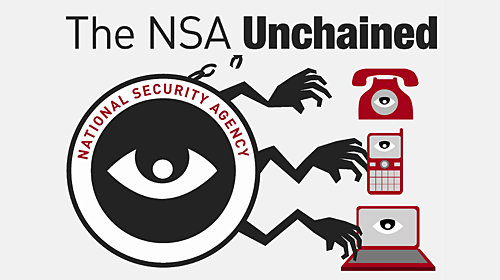
Last week, an impressive array of individuals and organizations filed briefs in support of the ņŌįń√ŇŅ™ĹĪĹŠĻŻ's challenge to the massive surveillance program under which the NSA keeps a record of every phone call made or received in the United States. You can read their briefs‚ÄĒincluding those from the National Rifle Association and Rep. Jim Sensenbrenner‚ÄĒhere. A federal court in New York will hear oral argument in our lawsuit on November 1.
While that argument is still weeks away, expect some big news tomorrow. The government is expected to release previously secret decisions of the Foreign Intelligence Surveillance Court as part of the ņŌįń√ŇŅ™ĹĪĹŠĻŻ's long-running Freedom of Information Act ("FOIA") lawsuit seeking documents relating to the government's surveillance under the Patriot Act.
We filed our FOIA lawsuit in 2011 seeking secret legal opinions‚ÄĒfrom the secret surveillance court in D.C. and from the government's lawyers‚ÄĒdescribing the extent of the government's surveillance authority under Section 215 of the Patriot Act.
The provision has a very troubled past.
In May 2011, members of the Senate Intelligence Committee warned the public that the Justice Department had relied upon a secret interpretation of Section 215 that would shock Americans. "When the American people find out how their government has secretly interpreted the Patriot Act," Sen. Ron Wyden (D-Ore.) , "they will be stunned and they will be angry."
Wyden's warning proved prescient when, in June 2013, it was revealed that the NSA collects from telephone companies, on an ongoing basis, the phone records of all Americans‚ÄĒincluding information about whom we call, who calls us, when, and for how long. As we recently explained in our lawsuit challenging that program, Americans' call records are incredibly sensitive, especially when aggregated over long periods of time.
On the heels of those disclosures, we immediately pressed the government in our FOIA suit to release the secret court opinions authorizing the NSA's dragnet surveillance of all Americans. to expedite its review of those opinions and to release any portions of them it decided to release by September 10. The government also agreed to review other related documents for possible release on October 10 and October 31.
The government came to a similar agreement in filed by our friends at the Electronic Frontier Foundation.
Stay tuned for the disclosures sometime tomorrow.
Learn more about government surveillance and other civil liberty issues: Sign up for breaking news alerts, , and .

